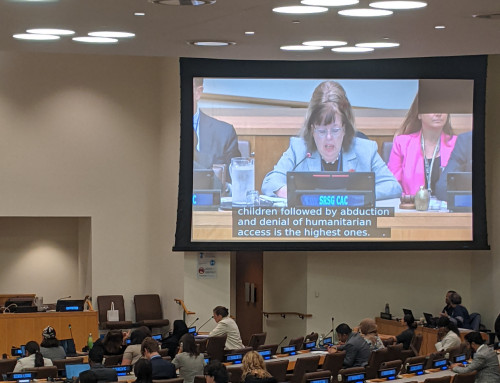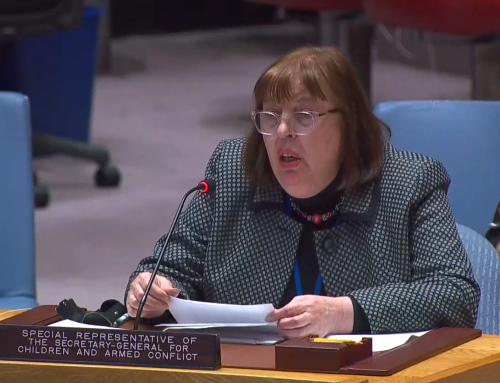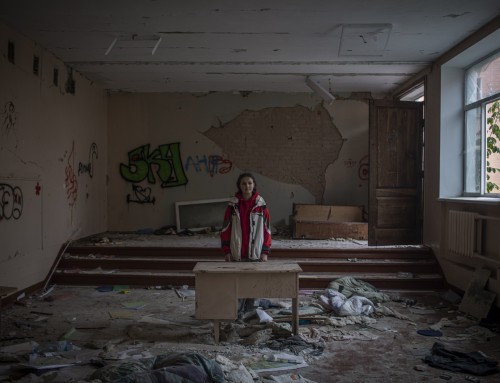Statement by the Special Representative of the Secretary-General for Children and Armed Conflict Ms. Leila Zerrougui
Check against delivery
Madame La Présidente, Membres du Conseil
Excellence, Messieurs le Commissaire Paix et Sécurité, Commissaire des Affaires Sociales, le Président du Comité des Experts, Excellence, mesdames et messieurs,
C’est un privilège et un honneur d’être ici aujourd’hui. J’aimerais commencer par remercier son Excellence l’Ambassadrice de la Tanzanie pour l’initiative de tenir cette session et pour l’invitation d’adresser le Conseil.
Madam President, Members of the Council.
Your decision to dedicate a session to Children affected by Armed Conflict is a landmark development demonstrating the importance you attach to this agenda.
Africa’s support to this mandate is not new. In 1996 Graca Machel’s Study on the impact of Armed Conflict on Children provided the foundation for the creation of this mandate and for the establishment of the Office of the Special Representative of the Secretary-General for Children and Armed Conflict by the United Nations General Assembly.
Olara Otunnu of Uganda was the first Special Representative, he set out the framework and tools for the implementation of this mandate. His vision enabled the engagement of the Security Council on children and armed conflict, which is today an integral part of the broader peace and security agenda.
Africa has come a long way in establishing protective frameworks for the protection of children in armed conflict. The African Charter on the Rights and Welfare of the Child, adopted by the Organization of African Unity in 1990 defines children as persons under the age of eighteen and prohibits their recruitment by armed actors.
Madam. President, Excellencies, Ladies and Gentlemen,
Africa is already thinking about its most important citizens – its children. The Open Sessions held by this Council since 2010 and our meeting today demonstrate the political will and the commitment to protect them from the scourge of war.
But we must learn from our own history.
The images of the tragic impact on children of the wars in Liberia, Sierra Leone, in the DRC on children are still with us.
The very same tragedies are unfolding today in the Central African Republic and South Sudan, but also in Somalia and in other conflicts on the continent, where despite our common efforts children are still bearing the brunt of conflict.
Everyday scores of children are recruited, killed, maimed, abducted, raped. Their schools are attacked or transformed in military posts. Girls are the most vulnerable: when they are not forced to marry or used as sex slaves, they are prevented from going to school for fear of insecurity.
We are losing another generation of children to war.
Governments bear the primary responsibility to protect their children, especially at times of war when they are most vulnerable. To mitigate the impact of children in conflict, their protection must be part of any mediation process and peace talks since the early stages. This is where the African Union can and must make a difference.
Madame. President, Members of the Council
Peacekeepers must be trained to react appropriately when faced with a child seeking their help.
Mechanisms for the release and reintegration of children into their families and communities must not only be created but they need to be sustained over time. Even when we are successful in minimizing the impact of conflict on children, we are not able to guarantee them a future free from want and insecurity because of our failure to sustain these protective environments.
To protect children we must tackle the root causes of conflict and develop preventive strategies to ensure that children are not re-recruited in times of instability or enlisted by criminal gangs, due to the lack of access to education or youth employment opportunities.
Madame. President, Members of the Council,
These are challenges that no one can overcome in isolation. We must redouble our efforts and join forces; we have the opportunity to leverage our comparative advantages and forge strong partnerships to respond to the plight of children.
During my tenure, I have made of partnership with regional organizations and with the African Union a priority.
On 17 September 2013, a partnership between my Office and the Peace and Security Department of the Commission formalized the ongoing engagement with the United Nations and UNICEF on the children and armed conflict agenda.
One of the key goals of this arrangement is to support and strengthen the integration of child protection in the operational and tactical response by African Union –led peace operations, such as AMISOM and MISCA.
But this partnership aims at developing a multi-year programme, to ensure that child protection is integrated, as appropriate, in all the activities of the African Union.
I am pleased to report that through the support of UNICEF a dedicated child protection advisor is now deployed within the Peace and Security Department. This is an initial yet important step to further advance our joint work.
Madam President, Members of the Council, Excellencies, Ladies and Gentlemen,
I am here today to reiterate my support to the African Union, to strengthen ties with the Council, the Commission and the Committee of Expert.
Synergies among these bodies and between these bodies and the United Nations are key to translate commitments into action for the protection of children. But I am also here to plead for your support to achieve a key goal of my mandate.
On 6 March, I have launched a campaign to end child recruitment by government forces in conflict by 2016. I am very pleased for the support you have already demonstrated to my mandate and to the this campaign, in New York, but also more recently in Geneva on the occasion of my presentation to the Human Rights Council.
I commend the African countries who have already committed to accelerate the implementation of action plans which they have concluded with the United Nations to end recruitment and use of children and I pledge to them my full support. I stand ready to pursue dialogue with those who have not yet done so.
I would like to build on this momentum and it is my hope that this Council will become a champion of the “Children not Soldier Campaign”.
Five of the eight countries concerned are African. Chad, which is present here today has already achieved tremendous progress, setting an important precedent that through partnership and political will concrete results can be achieved.
It is my strong belief that together we can build a secure and prosperous future for our children so that they can live without fear of being recruited, killed, abducted or raped.
Thank you Madam President for inviting me to brief this Council, I count on your support to realize our collective commitments to protect African children.





